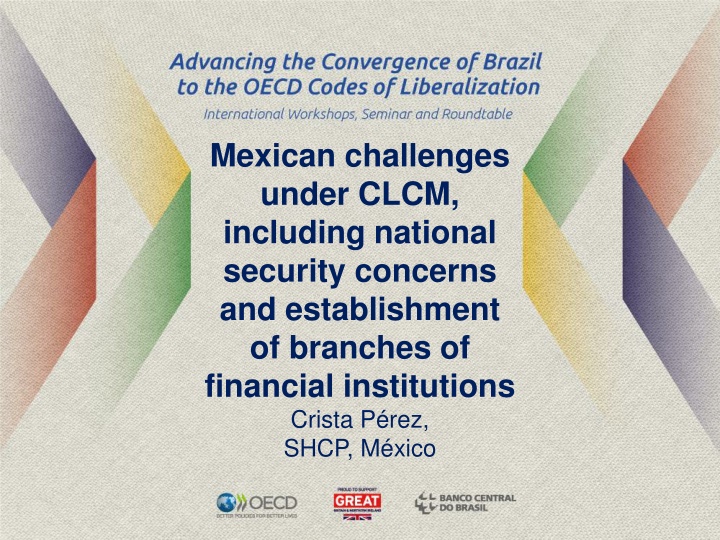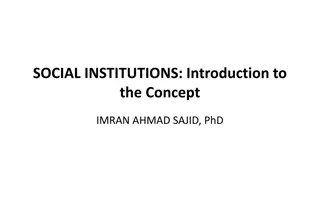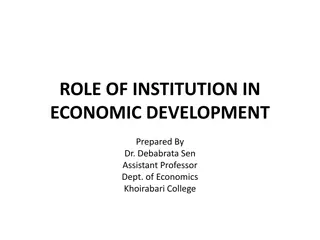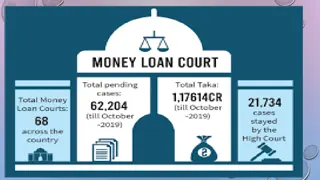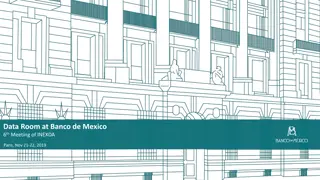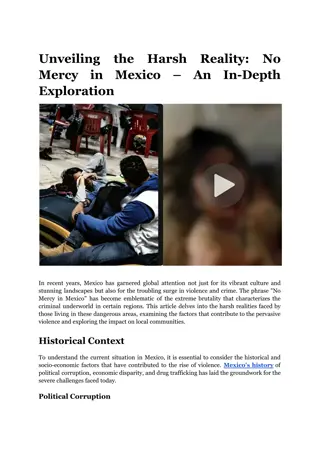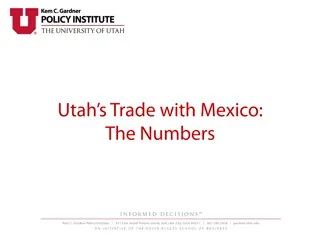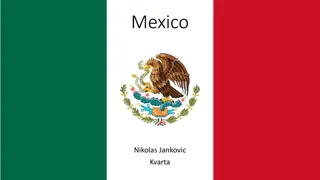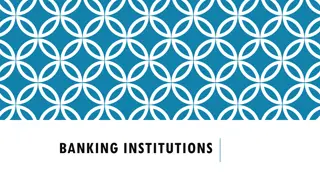Challenges Faced by Mexico Under CLCM and Establishment of Financial Institutions
Mexico faced challenges related to national security concerns and the establishment of branches of financial institutions under the Codes of Liberalisation of Capital Movements (CLCM). The country's entry into the OECD in 1994 marked a significant period of liberalization and reforms, including extending NAFTA treatment to OECD members and liberalizing capital markets. Mexico's commitment to international agreements and policies has shaped its economic relations and development.
Download Presentation

Please find below an Image/Link to download the presentation.
The content on the website is provided AS IS for your information and personal use only. It may not be sold, licensed, or shared on other websites without obtaining consent from the author.If you encounter any issues during the download, it is possible that the publisher has removed the file from their server.
You are allowed to download the files provided on this website for personal or commercial use, subject to the condition that they are used lawfully. All files are the property of their respective owners.
The content on the website is provided AS IS for your information and personal use only. It may not be sold, licensed, or shared on other websites without obtaining consent from the author.
E N D
Presentation Transcript
Mexican challenges under CLCM, including national security concerns and establishment of branches of financial institutions Crista P rez, SHCP, M xico
Agenda 1. Initial remarks. 2. Mexico s Challenges under CLCM. 2.1 When Mexico became a OECD member. 2.2 Late 90 s. 2.3 Recent reforms 2014. 3. Branches of financial institutions. 4. National security concerns. 5. Conclusions.
1. Initial remarks From the OECD Codes Of Liberalisation User's Guide 2008. The Codes have served as a tool to measure readiness to share their peers philosophy of international economic relations. Candidates for membership may lodge reservations, and it will be accepted that their reservation lists start out being lengthier than those of the established members. They must show, however, that they are approaching a sufficient stage of liberalisation. If necessary, they need to improve existing policies so as to move closer to OECD standards.
2.1. When Mexico became OECD member Mexico's entry into the OECD, together with the establishment of the North American Free Trade Agreement (NAFTA), marked the beginning of a period in which Mexico began to recognize itself as an economy with multiple belongings. Mexico undertook decisive liberalisation since late 80 s. Mexico was looking for coming closer to industrialised countries by means of dialogue and to commit to permanent and irreversible reforms. Advanced NAFTA negotiations when Mexico and OECD started a closer approach. 1991-1992 Mexico participated in some committees; 1993, initiated a formal process to join the OECD. Challenges: To have a deep understanding of Mexico s public and social policy; To maintain fluid communication with relevant agencies; To analyse Decisions, Recommendations and Declarations to determine the extent of the commitments and the reservations that were needed.
2.1. When Mexico became OECD member Mexico's commitments and reservations were consistent with the liberalization efforts. Mexico became an OECD Member in May, 1994. Mexico was the first country to join OECD after 23 years. Challenges: 1. Strike a balance in the discussions in committees (views from different levels of development); 2. Financial crisis affecting Mexico. The most important commitment was the liberalization of capital markets.
2.1. When Mexico became OECD member Mexico committed to extend NAFTA treatment to OECD members. In the financial sector, financial institutions from NAFTA countries were allowed to establish or acquire existing institutions in Mexico subject to market share restrictions applying during a transitional period from 1994- 1999. Mexico committed to extend this treatment to institutions from non-NAFTA countries with whom Mexico enters into international agreements. 1. Measures which liberalized the direct establishment of, and direct investment in some financial services sectors; and 2. Measures affecting banks, securities dealers, insurance companies and other financial institutions subject to market share limitations under NAFTA, Mexico agreed to consider extending the benefits of NAFTA to all OECD Members, no later than the beginning of 1998. Challenges: Internal discussions regarding the extension of the treatment.
2.2. Late 90s and the new millennium OECD Members would be able to enter the Mexican financial sector directly as well as indirectly via their off-shoots in North America. After the crisis, Mexico continued and expanded its liberalisation process in sectors or activities traditionally reserved to the Mexican State, such as: railways, telecommunications, gas distribution, etc. Asset thresholds for screening requirements of incoming investment were successively lifted during the period 1997-2000 in line with the NAFTA schedule. The reforms undertaken by the central bank eliminated the restrictions for Mexican currency internationalization. In 1997, the International Quotation System (SIC) started operations.
2.2. Late 90s and the new millennium OECD Members would be able to enter the Mexican financial sector directly as well as indirectly via their off-shoots in North America. Free Trade Agreement Negotiations between Mexico and the European Union. Challenges: Discussions on Mexico s approaches to reservations to CLCM. In 2002, restrictions applying to portfolio investment abroad by certain institutional investors, namely insurance companies and pension funds, were brought within the purview of the Capital Movements Code and made subject to its progressive liberalisation obligations. Mexico lodged reservations accordingly.
2.3. Recent reforms (2014- present) The economic reforms implemented during the current administration clearly shows the commitment with economic liberalisation and the OECD s standards. Mexico executed 11 structural reforms in order to modernize the laws, promoting more economic competition, and investments. FINTECH On March 2018, the Law to Regulate Financial Technology Institutions (FinTech Law), entered into force. Financial Telecom Challenges: Continue notifications. Ensure conformity with OECD codes. Conclusions of the revision of the Codes. Continue to promote open markets More FDI and liberalization through Recent Reforms Energy
3. Branches of financial institutions Foreign financial institution, are not permitted to establish branches within Mexican territory Current regime: subsidiaries (2008) Foreign banks branches (1941-1982) Banks Liberalisation (1990) nationalisation (1982-1990) Financial laws do not permit the establishment of branches of foreign financial institutions. Mexican regulations provide the legal basis for the establishment of subsidiaries of foreign banking institutions and representative offices, but the establishment of branches is no longer considered. Mexico lodged reservations to CLCIO: D/6 (foreign insurers) and E/7 (branches, agencies, etc. of non-resident investors in the banking and financial services sector). Challenges: Reminiscence of regimes.
4. National Security Concerns The OECD investment instruments recognize a Member's right to take actions necessary to protect its essential security interests. Mexican trade agreements and bilateral investment treaties contain exceptions for national security (e.g. Article 2102 NAFTA). Mexico has notified the following measures based on public order and essential security considerations: a. Investment Trans-sectoral: Mexico reviews all acquisitions of shares of Mexican-controlled enterprises (with assets over $150 million) exceeding 49 per cent of the equity. Defence: Sale or manufacture of firearms, cartridges, artificial explosives and fireworks. b. Corporate organisation Trans-sectoral, finance: board of directors.
3. Conclusions The codes have served as a tool to measure readiness to share the philosophy of international economic relations. Challenges at the entrance: to have a deep understanding of countries public policies, to maintain fluid communication with relevant agencies, to determine the extent of the commitments and the reservations that are needed. Challenges on the road ahead: internal discussions, continue notifications, to ensure conformity with OECD Codes, to lodge reservations in the revisions of the Codes. Branches and national security concerns: the Codes allow flexibility. Continue to promote open markets.
Mexican challenges under CLCM, including national security concerns and establishment of branches of financial institutions Crista P rez, SHCP, M xico
